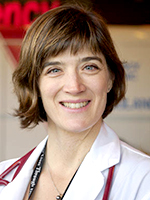
"I say yes to participate in research because it can prevent something negative from happening and help other people."
– Glen Medcalf, Vancouver
Just before Thanksgiving in 2023, Glen Medcalf’s wife, Lorrie, woke up to him thrashing in bed. “She told me that we needed to go to the hospital,” recalls Medcalf. “That’s the last thing that I remember.”
Medcalf was taken by ambulance to the emergency department. His vital signs were in the extremes and his throat was swelling up. Doctors, including attending emergency physician Dr. Corinne Hohl, a Vancouver Coastal Health Research Institute researcher, were fighting to save Medcalf’s life.
“At one point, he stopped breathing,” remembers Hohl. “His pH was 6.67, which was the lowest that I had ever seen in a patient.” A healthy pH level of blood and other fluids is between 7.35 and 7.45, with anything above or below requiring immediate emergency medical attention.
“Given what we were seeing, I suspected that he was likely experiencing an adverse drug event (ADE) caused by one of the medications he was taking,” says Hohl.
After waking up from a coma, Medcalf recalls noticing the feeding tube in his throat and feeling weak and disoriented. “Lorrie was very worried about me,” he recalls. “A family friend told me that she had been a pile of jelly on the floor when I was in the emergency department.”
“Over two million Canadians visit an emergency department every year due to adverse drug events.”
An ADE is an unintended and harmful occurrence associated with one or more medications. Repeat ADEs are when a medication that previously caused harm is mistakenly re-prescribed. This most commonly happens when a care team is not aware about a prior ADE because they are not connected to information about a patient’s ADE history.
Medcalf, who also lives with type 2 diabetes and high blood pressure, was managing his conditions with several medications, including Metformin, a common treatment for diabetes. However, in Medcalf, the medication caused a life-threatening adverse event called Metformin-induced lactic acidosis.
“Adverse drug events contribute to or cause one out of every nine patient admissions to the emergency department. One out of every three adverse drug events presenting to the emergency department is the result of a patient being re-prescribed the same medication.”
Hohl and her team created ActionADE to reduce unintentional re-exposures to previously harmful medications. The electronic platform can communicate information to community and hospital pharmacies across health sectors using the provincial PharmaNet network already in place at these facilities. Currently part of a randomized controlled trial, the goal of ActionADE is to increase patient safety, states Hohl.

“We do not want health providers to operate in silos, tracking ADEs only in their offices or at individual hospitals,” states Hohl. “We need a centralized database that offers an integrated ADE warning system that can prevent health providers from unknowingly re-exposing patients when re-exposure is not clinically indicated. ActionADE offers this solution.”
Prior to his 2023 hospitalization, Medcalf was admitted to hospital once in 2020 and again in 2021 for an ADE to the same culprit medication. Although less severe than what he would later experience in 2023, Medcalf’s broader care team did not receive or see the information about his ADE or its cause, resulting in him being re-prescribed the medication despite its harmful effects.
Watch Glen Medcalf share his ADE experience in this video:
Now in good spirits and health, Medcalf sits on the ActionADE research team as a patient partner. By sharing his story, Medcalf hopes to facilitate changes to the medical system that can help prevent future ADEs and patient harm.
“Everyone in the ActionADE group has something to contribute,” says Medcalf. “As a patient partner, I am there to share my experience and help the research team arrive at solutions.”
Learn more about Dr. Corinne Hohl’s research and ActionADE here.
This is one patient's story of participating in a research study. Your experience may differ. Learn about clinical trials before participating.


